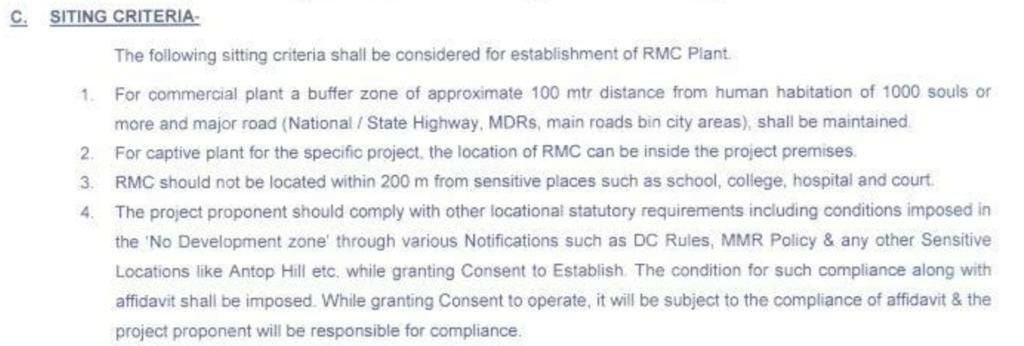We have been living in Orlem, Malad for many years now. But for the past seven months, we have been facing a dire situation due to the presence of an illegal Ready-Mix-Concrete (RMC) plant in the area. This plant has resulted in immense pollution and poses a serious health-hazard because of the cement particles. Residents have been falling sick and complaining to the authorities. Unfortunately, the government officials have shown no cooperation in addressing this problem, leaving the burden solely on the affected residents.
We have been in touch with the Assistant Municipal Commissioner, and local politicians, but have been unsuccessful in persuading authorities for the removal of the plant. The plant continues to operate beyond the permitted hours with minimal preventive measures in place. Orlem is a densely populated residential area with schools, churches, buildings, and marketplaces, making the situation even more alarming.
The BMC regulations say that industrial plant such as this one cannot be established within 200 metres of a residential area. Moreover, this plant is not captive, which means, it releases pollutants in the air, exacerbating the problem further.
Read More: Cementing resistance: Orlem citizens oppose a polluting concrete plant
RMC Plant under guise of SRA?

The plant’s establishment was falsely justified under the guise of a permit from the Slum Rehabilitation Authority (SRA). However, as there are no slums in our area, this project should not have been permitted. The question arises: How did the stakeholders manage to obtain the SRA permission? It is well known that SRA permits are granted when a redevelopment project is aimed at resettling the affected population.
When we approached the BMC officials, instead of halting the plant’s operations, they suggested measures to reduce pollution, without taking effective action. The plant began operating without adequate preventive measures, clearly violating the norms established by the Maharashtra Pollution Control Board (MPCB).
The plant owners have failed to provide any assurance to the citizens of Orlem that they have adhered to all the rules and regulations. Furthermore, both the SRA and MPCB have shown negligence by failing to provide the relevant documents when requested.
In response to a Right to Information (RTI) application filed with the MPCB, the project proponents refused to furnish the permission documents and compliance details. The draft notification passed by the MPCB clearly mentions the siting criteria for the plant, stating that it shall operate inside the project premises.
Read More: Interview with Slum Redevelopment Authority (SRA): Where does the slum-free Mumbai goal stand?

Urgent need for civic movement
We cannot keep our windows open because of the black cement. The constant presence of these particles causes severe respiratory problems. Children and senior citizens are at a graver risk with vulnerable health. In addition, there is immense noise pollution in the area, especially for societies located right opposite the plant.
Thousands of buildings are under construction in Mumbai, but granting anyone the right to install a hazardous RMC plant in a residential area is unacceptable. The provisions for Development Control and Promotion Regulation 2034 (DCPR 2034) clearly state that the structure shall be temporary for six months. Furthermore, it also says the plant shall stop its operations immediately after the stipulated period.
We have been demanding that the RMC plant be removed from its existing location. Even if someone possesses the necessary permits for operation, it should not come at the expense of jeopardising the health and well-being of the citizens.
Given that Orlem is densely populated, all of us have been forced to suffer the consequences of this pollution throughout the day. We have been trying to mobilise support – organisational and legal – to be able to prepare and file a petition and seek legal recourse in the near future.
Hence, we kindly request the residents of Orlem to come together and assist us in our efforts for the sake of good health of our children and families.
(Writing assistance provided by Pooja Bhatia)